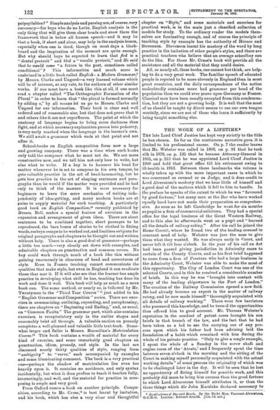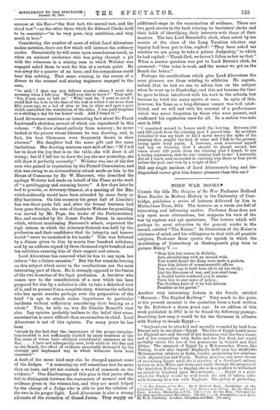THE WORK OF A LIFETIME.*
Tees late Lord Chief Justice has kept very strictly to the title he has chosen. So far as the continuous narrative goes, it is limited to his professional career. On p. 7 the reader learns that Mr. Webster was called in 1868, on p. 91 that he took Bilk in 1878, on p. 135 that be became Attorney-General in 1885, on p. 253 that he was appointed Lord Chief Justice in 1900 and held that great office till his retirement owing to ill-health in 1913. Between these landmarks the volume is wholly taken up with the more important canes in which he was concerned as counsel or as Judge, and it does credit to Lord Alverstone'a modesty that we hear little of himself and a good deal of the mutters which it fell to him to handle. In the preface he speaks of the extent to which he was "favoured by good fortune," but many men at the Bar who have worked equally bard have not made their preparation so comprehen- sive. As soon as he left Cambridge he went for six months as pupil to a firm of commercial solicitors. They had a special office for the legal business of the Great Western Railway, and to this also he afterwards went as a pupil and "learned all the details of railway rating." After his call he joined the Home Circuit, where he found two of the leading counsel in constant need of help. Webster was just the man to give them what they wanted. He was always early in Court, and never left it till four o'clock. In the year of his call an Act had been passed giving jurisdiction iu Admiralty cases to certain of the County Courts, and as his first brief happened to come from a firm of Proctors who had a large business in the Admiralty Court, Webster was able to make the most of this opportunity. The City of London Court was one of the selected Courts, and in this he received a considerable number of briefs. In this way be was "brought into contact with many of the leading shipowners in the Port of London." The creation of the Railway Commission opened a new field. He bud already become an expert in the matter of railway rating, and he now made himself "thoroughly acquainted with all details of railway working." There were few barristers who possessed this knowledge, and he turned the opportunities thus offered him to good account. Mr. Thomas Webster's reputation in the conduct of patent cases brought his son briefs in that branch of the law, and the fact that he had been taken, as a lad to see the carrying out of any pro- cess upon which his father had been advising laid the foundation of a habit which remained with him during the whole of his private practice. "Only to give a single example, I spent the whole of a Sunday in the screw shaft and engine room of the • Atrato,' and I frequently spent the time between seven o'clock in the morning and the sitting of the Court in making myself personally acquainted with the actual working details" of some process the originality of which was to be challenged later in the day. It will be seen that be lost no opportunity of fitting himself for possible work, and this probably did mole to bring him success than the good fortune to which Lord Alverstone himself attributes it, or than the three things which Sir John Kerslake declared necessary to • Recoltectio. of Bar and Bench. By the Right Hon. Viscount Aleeratouos B.C.M.G. London Edward Arnold. [Mt ed. net.]
success at the Bar—" the first tact, the second tact, and the third that "—or the other three which Sir Edward Clarke held to he essential—" to be very poor, very ambitious, and very much in love."
Considering the number of oases of which Lord Alverstone makes mention, there are few which will interest the ordinary reader. Occasionally he will come upon some human touch, as when an eminent coalowner who was going through a pit with the witnesses in a mining case in which Webster was engaged asked them to wait for him at a certain point. He was away for a quarter of an hour, and his companions could hear Lim sobbing. That same evening, in the course of a dinner to the counsel and mining engineers engaged in the case, "ho said,' I dare say you fellows wonder where I went this morning when I left you. Would you like to know ?' They said: ' Yes, if you care to tell us.' Well,' said he, ' I went to are if I could find the hole in the face of the coal in which I sat more than fifty years ago, as a lad of nine or ton, to shut and open a gate which controlled the ventilation of the mine. I was paid tenpence or a shilling a day for ten hours' work. And I found " Lord Alverstone mentions an interesting fact about Sir Frank Leawood's sketches, several of which are reproduced in this volume. "He drew almost entirely from memory ; he never looked at the person whose likeness he was drawing, and, in fact, his beat likenesses were frequently drawn in their absence." His daughter had the same gift and the same limitations. Her drawing mistress once said of her: If I tell her to draw the jug that is on the table, she will draw it all wrong ; but if I tell her to draw the jug she saw yesterday, she will draw it perfectly correctly." Webster was one of the few men who gained in reputation by the Parnell Commission, and this was owing to an extraordinary attack made on him in the House of Commons by Sir W. Harcourt, who described the apology Webster had made on behalf of the Times as the work of "a pettifogging and cozening knave." A few days later he had to preside, as Attorney-General, at a meeting of the Bar, which ordinarily would have been attended by some forty or fifty barristers. On this occasion the great hall of Lincoln's Inn was three parts full, and, after the formal business had been gone through, the vote of thanks to Webster for presiding was moved by Mr•. Pope, the leader of the Parliamentary Bar, and seconded by Sir James Parker Deane, in speeches which, without mentioning Harconres attack, expressed the high esteem in which the Attorney-General was held by the profession and their confidence that its integrity and honour would " never be tarnished in his hands." This was followed by a dinner given to him by nearly four hundred solicitors, and by an address signed by three thousand eight hundred and ten solicitors assuring him of their respect and esteem.
Lord Alverstone has reserved what he has to say upon law reform " for cloture ocemion." But the few remarks hearing on this subject which occur in the recollections are the most interesting part of them. Be is strongly opposed to the fusion of the two branches of the legal profession. A barrister who conies new to the consideration of a case which has been prepared for him by a solicitor is able to take a detached view of it, and to present it as a complete story, whereas the solicitor who has spent months perhaps over the preparation of the brief "is apt to attach undue importance to particular incidents without sufficiently considering their bearing us a whole." This, he tells us, was Sir Charles Russell's view also. Lay opinion probably inclines to the belief that cross- examination-is more difficult than examination-in-chief. Lord Alverstone is not of this opinion. For many years he has been "struck by the fact that the importance of the proper examina- tion-in-chief is not sufficiently studied by many members of the Bar, some of whom have attained considerable eminence at the Bar. . . . I have not infrequently seen, both while at the Bar and on the Bench, the effeet Of evidence practically destroyed by rho slovenly and haphazard way in which witnesses have been examined."
A fault of the same kind may also be charged against some of the Judges. "A Gumming-up will sometimes last for more than an hour•, and yet not contain a word of comment on the evidence." One disadvantage of this plan is that juries often fail to distinguish between the statements of counsel and the evidence given in the witness-box, and they are much helped by the charge of a Judge who is able to put the relation of the two in its proper light. Lord Alverstone is also a strong advocate of the retention of Grand Juries. They supply -an additional-stage in the examination of evidence. There ate two good stories in the book relating to barristers clerks and their• habit of identifying their interests with those of their masters. The late Lord Herschelre clerk, when asked by his master at the close of the Long Vacation whether any inquiry had been put to him, replied : "They have asked Me whether we are going to take a puisne Judgeship," to which he had replied: "Thank God, we haven't fallen as low as that." When a similar question was put to Lord Bowen's clerk, he answered: "Our voice is weak, and the sooner we get on the Bench the better."
Perhaps the recollections which give Lord Alverstone the most pleasure are those relating to athletics. He regrets, indeed, that he had no one to advise him on the subject when he went up to Cambridge, and this not because the time he gave to them interfered with his work in the schools, but because he tried too many sports at once. In spite of this, however, his fame ae a long-distance runner woe well estab- lished, and we will end with his account of a performance which was never forgotten by those who were present, and confirmed his reputation once for all. In a certain two-mile race in 1864
" I remained second to Lewes nntil the last lap. Between ?.00 and 210 yards from the winning post I passed him. By accident (whether it was my fault or his I never knew) the spike of his running shoe caught the heel of mine and I fell to the ground, losing quite forty yards. I, however, soon recovered myself and ran on knowing that I should be placed second, but when about 120 yards from the winning post I found, to use a racing expression, that he was' coming back to me.' I naturally did all I knew, and succeeded in catching him three or four yards before the post, and won by a couple of feet."
Did any single incident of Lord Alveretone's long and dis- tinguished career give him keener pleasure than this one?



















































 Previous page
Previous page